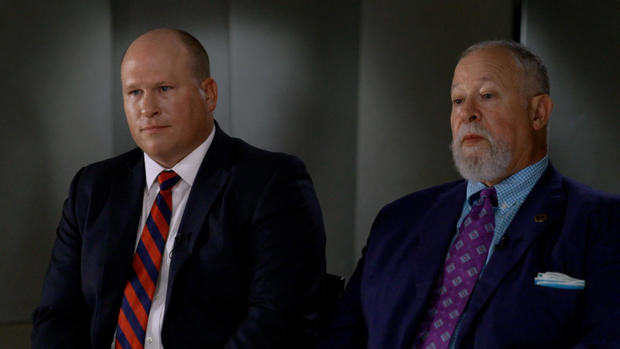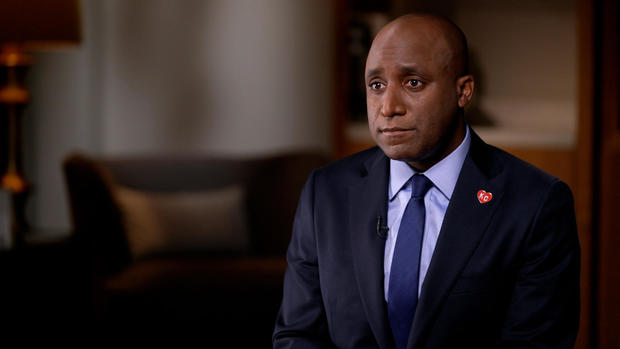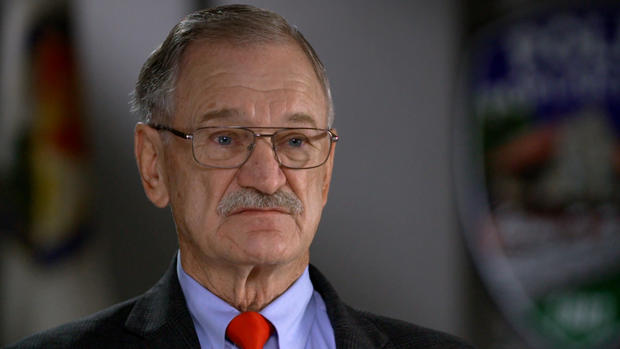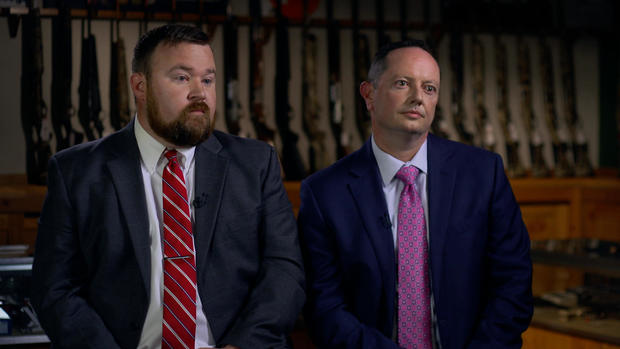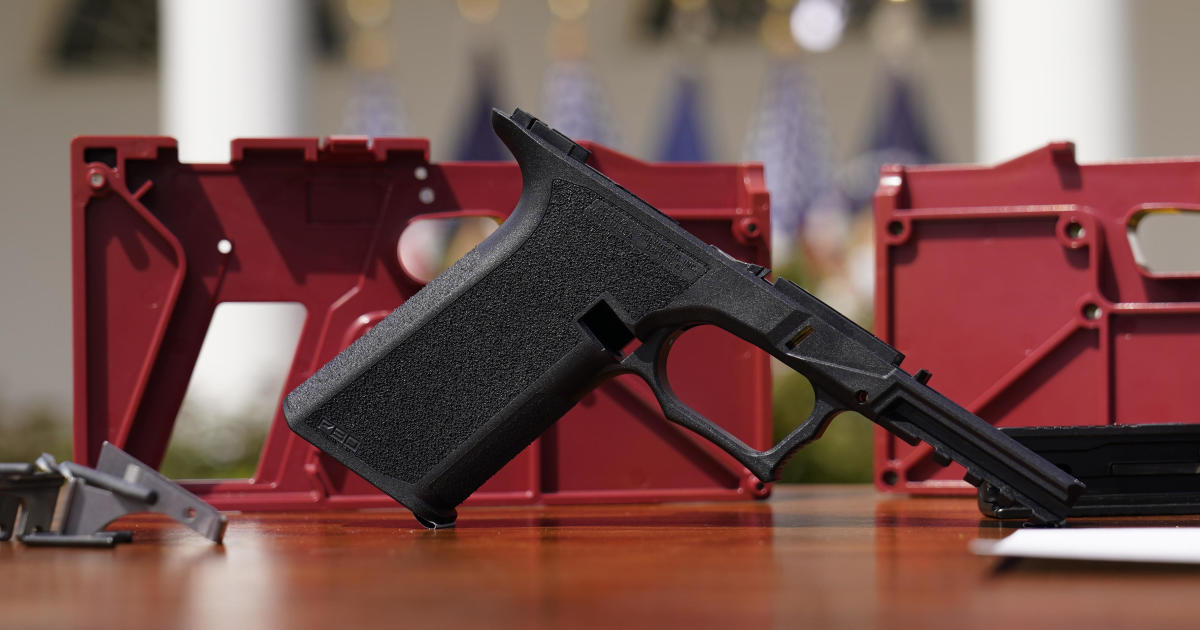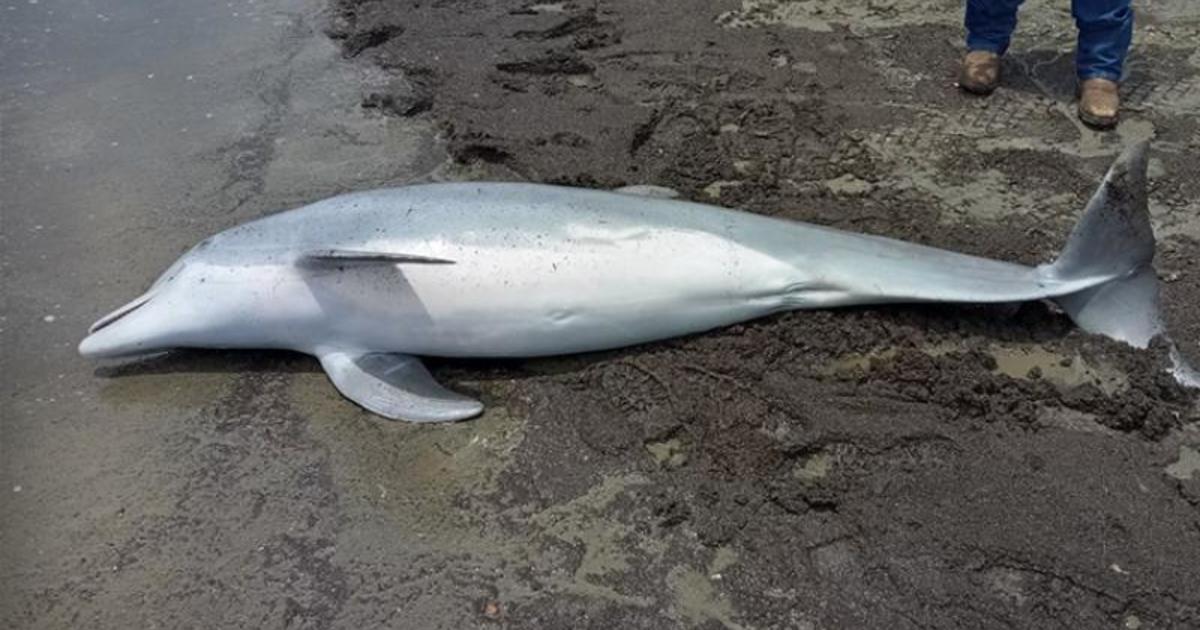Missouri's Second Amendment Preservation Act outlaws local enforcement of federal gun laws
Editor's note: Following this 60 Minutes report from November, "Missouri's Second Amendment Preservation Act," on February 16, 2022, the U.S. Department of Justice sued to stop the state's gun law. The federal lawsuit against the state of Missouri cited 60 Minutes, mentioning that the report included interviews with local law enforcement agents who believed the law "benefited criminals."
A new and potentially precedent-setting state gun law passed in the spring in Missouri. It's called the Second Amendment Preservation Act, or SAPA for short. It prohibits state agencies from helping the federal government enforce any law, rule or regulation which Missouri considers an infringement on the right to bear arms. Each violation can carry a $50,000 penalty.
Think of it like this, for a police officer in Missouri, federal gun laws, effectively, no longer exist. Missouri Democrats and lawyers at the U.S. Department of Justice argue the new law is unconstitutional, but what got our attention is that a significant number of conservative police and prosecutors who love their guns don't like this law.
Kacey Proctor: I think a lotta people when they hear about this bill-- at least a lotta people in Missouri that have heard, they think, "This is great. The state of Missouri's told the federal government to go mind their own business and stay away from our guns." But what this bill does is impact a local law enforcement officer's ability to do their job.
Kacey Proctor serves as the prosecutor for rural Butler County. Steve Sokoloff is general counsel for the Missouri Association of Prosecuting Attorneys.
Norah O'Donnell: Do you have a history of opposing laws that would expand Second Amendment rights in Missouri?
Kacey Proctor: Absolutely not. I'm a member of two different gun clubs. I shoot once a week at minimum. My kids shoot, my 7-year-old owns multiple firearms. I am all in favor of responsible people owning firearms and raising their children to own firearms responsibly. And so yeah, I'm 100% in favor of expanding Second Amendment rights.
Norah O'Donnell: So then why do you oppose Missouri's Second Amendment Preservation Act?
Kacey Proctor: What I oppose about it, and what I would ask for to be-- to be looked at and possibly fixed is the ability for law enforcement officers to interact with their federal partners to go after people who are violent in nature and are-- committing crimes in our community.
President Biden at White House: We should also ban assault weapons and high-capacity magazines in this country
President Biden's repeated calls for stricter gun control laws motivated Republican legislators in Missouri to pass the Second Amendment Preservation Act.
And this past June, at a gun store outside of Kansas City called Frontier Justice, Governor Mike Parson signed it into law. Supporters hailed the bill as a legal shield to safeguard Missourians' gun rights, from what they consider to be federal overreach.
Norah O'Donnell: I mean, Missourians did overwhelmingly elect a Republican legislature and a Republican governor. I mean, isn't this just democracy?
Stephen Sokoloff: I think that-- that the general public, if they understood what was in this statute, that-- that they wouldn't be in favor of it.
At the core of the bill lies a bold proclamation.
"All federal… laws… and regulations… that infringe on the people's right to keep and bear arms as guaranteed by the Second Amendment to the [U.S.] Constitution… and the Constitution of Missouri… shall be… rejected by this state… and shall not be enforced by this state."
The bill outlaws Missouri state resources from being used to further federal gun regulation. But the sweeping law doesn't stop there. It also dictates under what circumstances a Missouri officer can help a federal agent investigate or prosecute a gun crime.
The prosecutors say it's these provisions of the law that are vague, poorly written, and create a legal minefield for Missouri law enforcement. Agencies that break the law are "subject to a civil penalty of $50,000…" payable to a Missourian who believes their 2nd Amendment rights were violated.
Stephen Sokoloff: And the problem here is that-- that it has a tremendously chilling effect on-- on-- law enforcement officers because they're put in a position of guessing about what conduct is prohibited by the statute.
Norah O'Donnell: It seems like this law would fundamentally change the criminal justice system and the way it works here in Missouri.
Stephen Sokoloff: It already has.
We've learned Missouri law enforcement agencies pulled at least a dozen officers from federal task forces that targeted illegal guns. In addition, the state highway patrol's information and analysis center will no longer provide investigative support to the Bureau of Alcohol, Tobacco and Firearms, or ATF.
Kansas City Mayor Quinton Lucas told us this could not be happening at a worse time for Missouri, where the murder rate in the state is nearly twice the national average. Before the law passed, it was routine for local police to work with their federal partners.
Norah O'Donnell: Why does local law enforcement want the help of the federal government when it comes to dealing with gun violence?
Mayor Quinton Lucas: The volume of crime. The volume of incidents. On a night in Kansas City, you can have multiple people shot. In the same way that if you have a severe storm hit a city, we bring in federal resources to help us with that crisis. This is the problem with gun violence right now in some of America's major cities. Particularly in the Midwest, particularly in Missouri.
Mayor Lucas says he's concerned that under Missouri state law, people convicted of domestic violence misdemeanors are still allowed to have a gun.
Mayor Quinton Lucas: There's been a domestic violence loophole in Missouri law for years now. The saving grace alone was that there was a federal law that a police officer could say they're violating. Now that we lose that, what does this mean for so many Missourians? So many survivors of domestic violence? I hope it doesn't make them victims.
Since 2017, the FBI has identified 744 people in Missouri convicted of a domestic violence misdemeanor who then broke federal law when they tried to buy a gun. According to the ATF, local law enforcement was key to investigating these cases on the ground in Missouri. If those same officers helped the atf with cases like that today, they would be breaking state law.
Norah O'Donnell: Are local law enforcement essentially gonna stop and think twice before trying to stop someone with an illegal gun?
Mayor Quinton Lucas: Yes. Now, if you stop someone with a firearm, you may be asking yourself, "Do I wanna be subject to litigation? Do I wanna subject my department to liability?" And in many cases the answer's going to be no.
St. Louis and Jackson County are suing to stop Missouri's Second Amendment Preservation Act in state court. So far, without success. In southeast Missouri, police and prosecutors started a campaign to have the law changed. Chief Danny Whiteley is leading that effort.
Danny Whiteley: Something bad's gonna happen. And I'm gonna be the first one to say, "I told you so."
He's the longest-serving police chief in the history of Poplar Bluff, a small city near the Ozarks, that he says has a big city gun violence problem.
Chief Whiteley told us he's no longer working with federal prosecutors and misses the help.
Danny Whiteley: Number one, they have a lot of resources that we don't-- manpower-wise and forensics-wise. And if they get convicted in Federal Court, they're gonna do 85% of the time.
He shared with us summaries of nine recent alleged gun crimes he says he would usually refer to the nearby U.S. attorney's office for prosecution.
Norah O'Donnell: Yeah, I've looked at some of them. And one of them is a guy who shot at his ex-girlfriend, shot at her vehicle in a convenience store.
Danny Whiteley: Correct.
Norah O'Donnell: But you're not gonna refer that to a federal prosecutor?
Danny Whiteley: That's correct.
Norah O'Donnell: Why?
Danny Whiteley: Because of the (LAUGH) $50,000 fine.
Norah O'Donnell: Several policemen and sheriffs that we've spoken to have told us they think that this law benefits criminals. Is that too strong of a statement?
Danny Whiteley: No. Don't think it does, I know it does.
Butler County Prosecutor Kacey Proctor says the new Missouri law makes it more difficult to catch unknown assailants who've committed gun crimes.
Kacey Proctor: Probably two months ago. We had a murder that was being investigated here in Poplar Bluff. While that murder was going on-- about 10:00 at night on Highway 67, two vehicles parked on the highway and dropped about 17 rounds in the middle of the highway.
Norah O'Donnell: And when you say "drop" you mean "fire."
Kacey Proctor: I mean fire, correct.
Kasey Proctor says he rushed to the scene of the gunfight where one person had been shot in the stomach. He found police debating whether they should send some of the 17 spent shell casings found on the road to the ATF for analysis and tracing.
Kacey Proctor: So we had to have that conversation (LAUGH) after we were investigating a murder, while investigating a shooting-- on the side of the highway at 10:00 at night. And the ultimate conclusion from the local department was, "We're not gonna send these to the ATF because we're not gonna risk violating SAPA."
Norah O'Donnell: But that's the whole point of investigative work, is to pick up the rounds, put 'em in a database and see if they match any other crimes.
Kacey Proctor: Correct.
Stephen Sokoloff: It should be.
For smaller police departments like Poplar Bluff which don't have the technology themselves, ATF can analyze shell casings in order to match them with guns from other crimes. Poplar Bluff is just one of several departments who've stopped sharing evidence with the ATF ballistics network, for fear of violating Missouri's new gun law.
Kacey Proctor: About two hours later they had another shooting. And while they were investigating that shooting they had another one. And that was all in the city of Poplar Bluff.
Norah O'Donnell: And you think it could've been the same people.
Kacey Proctor: Could've been, but we still don't know who it was.
This past July, the first plaintiff to try out the new law in court, was an accused drug dealer, who police say was busted with 58 grams of cocaine and four firearms. He pled not guilty to the charges and then turned the law on law enforcement, suing the officers to prevent them from testifying against him in federal court. Kacy Proctor volunteered to represent one officer. The lawsuit was dropped, but it sent a message.
Kacey Proctor: I could tell you for a fact that two of the police officers that were sued over the Second Amendment Preservation Act in Ripley County told me that as soon as they can retire, they will. They're tired of this stuff. I'm afraid that we're gonna make it so difficult to be a police officer in this country that nobody's gonna wanna do it.
Missouri State Senator Eric Burlison and State Representative Jered Taylor co-sponsored the Second Amendment Preservation Act. They say there are plenty of Missouri law enforcement officers who support the law and are not having any issues. Those having problems, they say, don't yet understand it or are receiving poor advice.
Missouri State Representative Jered Taylor: I think there's bad information. I think that they're getting bad information. If you ask ten different attorneys, they're gonna give you 15 different answers on-- any number of issues.
Norah O'Donnell: Some of the-- law enforcement that we spoke with in Southeast Missouri, they say it's preventing them from putting bad guys away with federal help. How do you respond?
Missouri State Senator Eric Burlison: I think that the dust needs to settle. Any bill that comes out, originally there might be ambiguity from understanding what the intent of the bill was our intention is to make certain that-- that law enforcement is not hindered in any way.
Norah O'Donnell: You're aware that there are several police departments and county prosecutors who have stopped working with the ATF and U.S. attorneys on gun crimes all together?
Missouri State Representative Jered Taylor: And there are several that are still working with them.
Norah O'Donnell: What about those that are not working with them?
Missouri State Representative Jered Taylor: I think it's unfortunate because I don't think that this law prohibits that.
Poplar Bluff Police Chief Danny Whiteley disagrees. Last month, he joined five other police chiefs, six county sheriffs, and eight county prosecutors in a letter to Governor Mike Parson that asked for a meeting to discuss how they might amend the law.
The governor, a former county sheriff himself, has said he might be open to changing it.
Governor Mike Parson: I think that there's things out there we can correct. I think we need to do a little better job making sure we're out here talking to law enforcement, understanding the everyday issues they're facing.
Norah O'Donnell: Would you be willing to go back and say, "Okay, let's take a look at the law and make the changes."
Missouri State Representative Jered Taylor: I'm not willing to-- to even consider that at this point. But, of course, I'm always willing to work with law enforcement and-- and, you know, better understand the way that they operate and what they do.
So far, 17 states have laws on their books similar to the Second Amendment Preservation Act, though none goes as far as Missouri.
Norah O'Donnell: Have you heard from legislators in other states who say, "We wanna do the same thing"?
Missouri State Representative Jered Taylor: Absolutely. I've been contacted by multiple legislators-- across the United States-- asking for help and asking for the resources that we used in order to pass our legislation.
The future of that legislation will be decided in court. St. Louis' suit against the Second Amendment Preservation Act should get to Missouri's highest court next year. The U.S. Department of Justice has not yet decided whether to file its own lawsuit. The co-sponsors of the law say they're ready.
Norah O'Donnell: Do you think this goes to the Supreme Court?
Missouri State Representative Jered Taylor: Absolutely.
Norah O'Donnell: You do?
Missouri State Representative Jered Taylor: I do.
Norah O'Donnell: Do you like your chances?
Missouri State Senator Eric Burlison: I love our chances.
Produced by Keith Sharman. Associate producer, Kate Morris. Broadcast associates, Annabelle Hanflig and Olivia Rinaldi. Edited by Richard Buddenhagen.
